As more and more consumers rely on search engines to find what they need, having a strong search engine positioning strategy is essential for any business looking to succeed online.
If your website's content doesn't rank on the first page of search engine results pages (SERPs) on Google, Bing, DuckDuckGo, or other search engines, it may as well not exist for most people. In general, a rank of three is ideal for most searches.
For example, a rank of one for "vacuum cleaner," "dentist," or "best vacuum cleaner." In other words, the most valuable SERP position on page one is position one for the majority of searches.
Most Google users want to click on the first result, with the second result getting a quarter of the clicks.
What does search engine positioning mean?
Like most companies, you want as many people as possible to visit your website...
To do this, you need to use search engine positioning and optimization. Search engine optimization is the mixture of several ingredients that can create a textured and tasty cake.
You also need to create content that appeals to both users and web crawlers. And you need to use keywords judiciously throughout your site.SEO takes more time than cost-per-click (CPC) advertising, but it has long-term advantages regarding visibility in organic searches.
| Search Engine Positioning is the race to the summit, where the peaks of visibility and relevance are reached through a combination of strategy, skill and persistence. |
The ranking is determined by a complex algorithm that takes into account various factors, including the relevance and quality of the content, the number and quality of backlinks, and the overall user experience.
How does a search engine determine a web page's position?
Understanding how search engines determine a page’s position requires knowledge of various elements including relevancy, keyword usage, and user engagement metrics like CTRs and bounce rates.
Knowing what goes into SERP rankings can help you optimize your website for better performance when customers enter queries into a search engine window.
- I used keyword and keyphrase usage and density.
- We can locate the keywords in the website's URL, in its title tag, and in its meta description tag.
- The keyword synonyms of the page and how different pages use keywords.
- The site is trustworthy.
- Backlinks to other web pages.
- Technical SEO factors, like loading speed and mobile friendliness, are related to the search engine results page (SERPs).
- The geographic location of the searcher.
- Google’s history and profile of the one who has searched for the keywords.
Using the criteria mentioned above, the search engine displays a high-scored search result.
Let's look at an example of what a positioning strategy might do.
For instance, if you search Google for "play bridge", the search results page might show a list of websites that have information on how to play bridge. If you have a low or 0-ranked organic ranking, and you want to be found for these queries, you need to optimize your page.
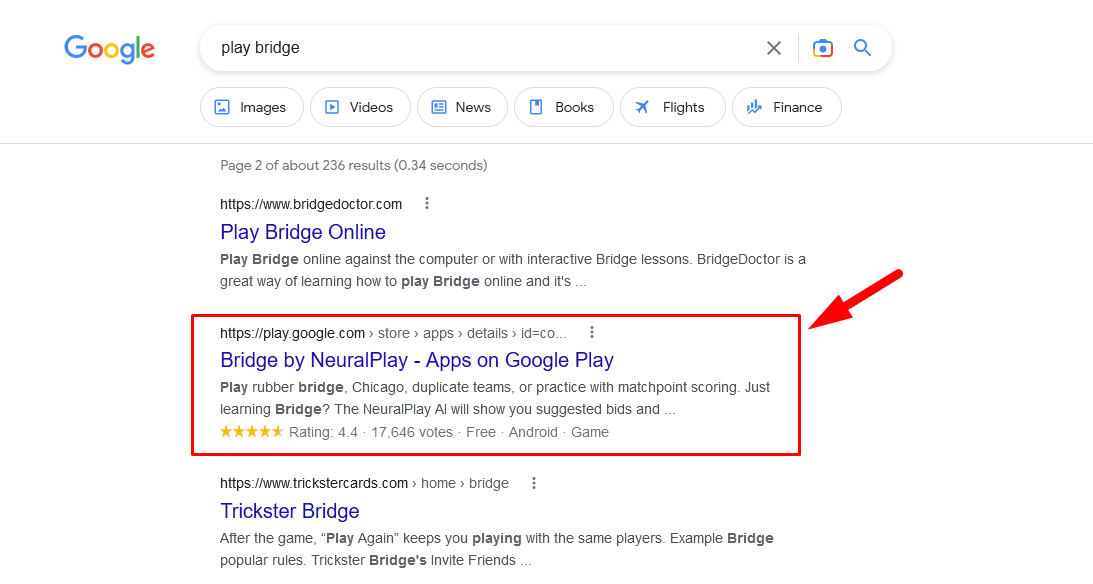
This page could be enhanced with search engine positioning techniques to help it gain prominence in the search engine results page (SERP). The objective is to make the page rank higher than websites that are currently ranking higher, to be featured in the snippet or question boxes, and to overall make it more visible on the first page of the SERP.
To achieve this, an SEO expert would need to understand how search engines are currently ranking the page and why it is not performing well.
Regarding understanding how search engines determine a page’s position, it is important to note that there are many factors at play. A search engine’s algorithm assesses all of these elements in order to determine which pages should appear higher up in the search results. One of the most important factors that affect a page’s ranking is its relevance to the query entered by the user.
Search engines assess how closely related a page is to the query by looking at the content on each page and its title tags, meta descriptions, and headings. A website will rank higher if it has more relevant content than other websites.
Another factor that plays into ranking is backlinks or links from other sites pointing back to your own site. The more backlinks your site has, the more credible it appears, and this will improve your ranking in search engine results pages (SERPs). Additionally, having quality backlinks from trusted sources will give you an edge over competitors who might have fewer or less reliable links pointing back to their sites.
Search engines also look at keywords used within web pages to help determine relevance and rank accordingly. Having keywords embedded throughout your website helps search engine crawlers understand what topics you specialize in and how you can best address relevant queries for users searching for information about those topics.
Track and analyze: keep an eye on your search engine ranking and website visits to ascertain the effectiveness of your optimization strategies. Leverage tools such as Google Analytics for assessing and scrutinizing the performance of your webpages.
Finally, other factors that contribute to SERP rankings include user engagement metrics such as time spent on the page, click-through rates (CTR) from SERP listings, and bounce rates.
The search engine positioning against the search engine optimization.
Search engine positioning refers to a website's ranking or position in search engine results pages (SERPs) for a given set of keywords or queries. It focuses solely on improving ranking.
On the other hand, search engine optimization (SEO) is the process of optimizing a website to improve its ranking in the SERPs. This includes techniques such as creating high-quality and relevant content, building backlinks from other reputable websites. Optimizing technical aspects of the website (such as its loading speed and mobile-friendliness), and promoting the website through social media and other channels.
SEO is more than just keywords. It includes not only the optimization of keywords but also domain authority. It includes not only your page but also your whole domain.
The goal of SEO is to improve a website's search engine positioning and drive more organic traffic to the site. Both search engine positioning and SEO are important for a successful online presence and often work together to help a website rank higher in search engine results and attract more visitors.
How Can You Find a Page’s Search Engine Positioning?
Knowing where your site ranks in relation to others on certain key phrases is essential for effective website optimization efforts — but it doesn’t have to be complicated! The most effective way to determine a page’s search engine positioning is to use a keyword-based rank-tracking tool.
These tools will show you how well a specific page ranks for certain keywords or phrases. Most tools that track SERP rankings also provide other related data, such as the estimated monthly search volume and the competition level of each keyword. This information can be useful for deciding which words or phrases are worth targeting to improve your ranking on those terms.
But the ranking position of a webpage for a certain keyword constantly changes over time. So periodic tracking of the positioning is very important, along with occasional re-optimizations.
Your website's ranking could fall if your links are broken or if another website does something better. If you're thinking of redesigning your website, it's important to make sure that your links are still intact. This way, users won't be lost when they arrive at your new site and can easily find the information they're looking for.
Website owners or developers can use specific desctop and mobile app tools to keep track (like a Rank Tracker Software) of all competitor activity and to devise strategies if there is any cause for concern.
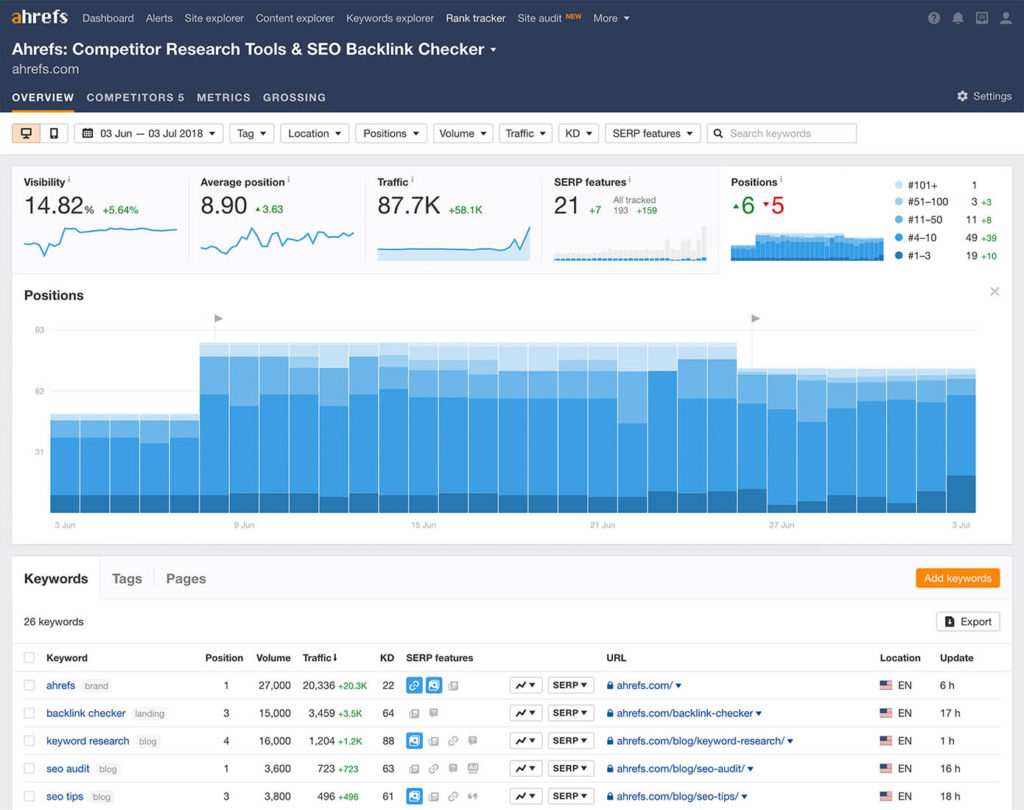
Another option is to manually check the SERPs by entering relevant keywords into any major search engine and searching for them directly. The problem with this approach is that it can take some time and effort since you will have to enter multiple searches with different keywords until you find the exact match and determine its ranking position in relation to other sites' pages.
Finally, if manual research proves too tedious or time-consuming, there are also various online services available that offer automated SERP tracking services at various levels of accuracy and cost-effectiveness depending on what type of data you need from them. These services allow users to check their positions on certain key phrases over time so they can see how their efforts affect their rankings over time as well as how their competitors are doing compared with them regarding keyword visibility.
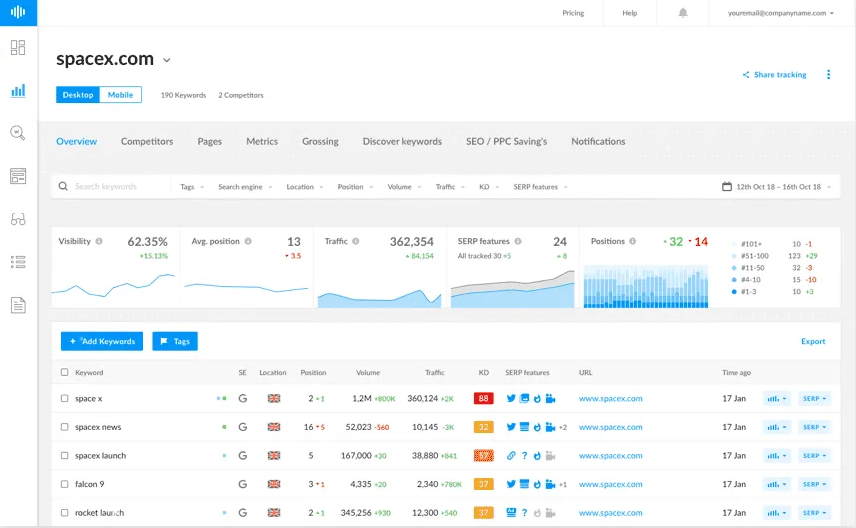
Whether through manual research or automated rank-tracking tools, finding out a page’s current ranking position has never been easier — so don’t hesitate to take advantage of this valuable resource today!
Top 5 tools to track my Google position ranking
Here is a possible article on the top 5 tools for tracking Google position rankings:
-
There exist various tools that one can use to measure the average position of a webpage for free. One of these is Google Search Console.
In Google Search Console you find the performance for a specific keyword. If you click on the page tab, you will find a list of all pages that are associated with that keyword. For example, you can see the page for the keyword “dentist London” here.
Knowing that certain tools exist that you can use to monitor your rankings and see how they change after you've made changes is helpful and important because it helps you to avoid making changes to pages and sites that only end up hurting your rankings.
-
SEMrush is a powerful all-in-one SEO tool that offers a wide range of features for tracking your Google position ranking. It provides detailed data on your search engine rankings, organic traffic, and competitors' keywords, as well as tools for keyword research, backlink analysis, and site audit.
-
Ahrefs is another comprehensive SEO tool that offers a range of features for tracking your Google position ranking. It provides detailed data on your search engine rankings, organic traffic, and backlinks, as well as tools for keyword research, site audit, and content analysis.
-
SERPWatcher is a specialized tool for tracking your Google position ranking. It provides detailed data on your search engine rankings for specific keywords, including changes in ranking, visibility, and traffic over time. It also offers tools for analyzing your competitors' rankings and identifying potential opportunities for improvement.
-
RankRanger is a tool that offers a range of features for tracking your Google position ranking. It provides data on your search engine rankings, organic traffic, and backlinks, as well as tools for keyword research and site audits. It also offers alerts and notifications when your ranking changes or when new opportunities arise.
Overall, these are some of the top tools for tracking your Google position ranking. Each tool offers unique features and capabilities, so it's important to choose the one that best fits your needs and budget. With the right tool, you can monitor your search engine rankings and take action to improve your position and drive more organic traffic to your site.
How do you improve search engine positioning?
Before examining the different approaches to boosting your search engine positioning, it’s essential to understand the various elements of SERP. These facets make up a SERP result for a given keyword, such as featured snippets, video SERPs, people also ask boxes, top stories, and image packs. As the SERP is not simply a simple list of organic search results, it is not a linear process to get a higher ranking. Websites can strive for rich snippets (pages with extra info) and even have multiple spots in search results for one query.
There are some usual techniques employed to enhance a webpage's search engine ranking, which we will discuss in more detail below.
Re-optimizing on-site to be more SEO-friendly.
If you want to enhance the search engine rankings of your substandard web pages, then re-optimizing the on-page content is probably the most effective approach. You can rework the current material in a few different methods.
- Replace statistics older than two years with up-to-date information, if it exists.
- Shorten intros and conclusions as much as possible.
- Answer queries in headings and subheadings first thing after the heading.
- Ensure length doesn’t affect comprehensibility and adjust if needed. Include extra headings and subheadings whenever necessary.
To start, you can discover what keywords your page is rated for and make certain that it is optimized for that specific keyword. This will involve verifying the keyword density, and ensuring that the keyword is distributed in all of the correct areas. The usage of associated keywords (that your web page is likely ranked for) might also be beneficial. Additionally, if your blog post is a bit dated, you can work on making it up-to-date. Enhancing the readability of your content, loading speed and overall usability of UX may also have positive effects on its search placement.
Make a link-building strategy.
Once you have used all the methods to make your page content more effective, the next step is creating a good internal linking structure. This will make it easier for search engines to crawl your site and will also improve its overall ranking in SERPs. You can incorporate internal links in two ways — via main content or through a sidebar.
Anchor texts which are keywords-based, help search engines understand what the linked page is about as well as make it easier for readers to find related pages.
Optimizing to appear in the ”Featured Snippets”
It’s becoming increasingly clear that, in the case of Google search results, many users look no further than the «featured snippets» section. Consequently, it’s a good idea for websites to try to get their content featured there. This can be done by creating an optimized part of the page that is perfect for inclusion in this section — by including images closely linked with the search query and addressing it directly with simple words. If you’re dealing with a guide-type web page, additionally add a summary outlining its main points, and include keywords in the «alt text» when adding images.
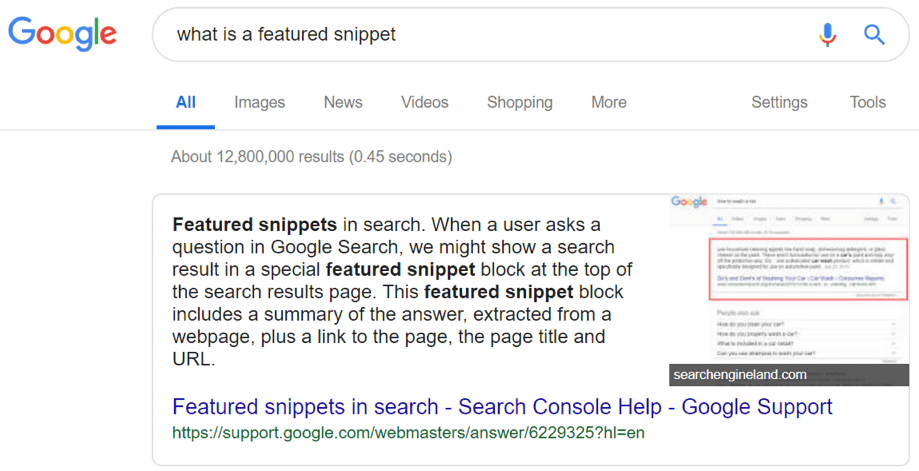
Consider New Content Strategies
If you’ve attempted to improve your search engine ranking using existing content, and have been successful, you should still aim to do better with every new page or piece of material. It may be simpler to gain desirable SERP positions by beginning from the beginning instead of trying to make adjustments to something that is already existent. Look into using some of the current content approaches popular on SERPs such as:
- Varying article lengths
- Joint social media plans
- Blog posts directing readers to popular gated content pieces
- External blogging with backlinks linking to internal pages
Raising your organic ctr can play a role in boosting your search engine positioning and consequently, you could receive more traffic and brand awareness. Doing a bit of search engine positioning can also aid in optimizing your website so that it is best suited for your organization, target market, and search engines alike.
A look back at Google and the individuals who searched for particular keywords.
 Google knows so much about us that it's almost scary. They have access to our email address, our search history, our location, and more. They can even see if we've been to a certain restaurant or if we like to travel. With the growing power of search engines, particularly Google, our personal data is becoming increasingly accessible. Have you ever stopped to think about how your search history and profile are being tracked?
Google knows so much about us that it's almost scary. They have access to our email address, our search history, our location, and more. They can even see if we've been to a certain restaurant or if we like to travel. With the growing power of search engines, particularly Google, our personal data is becoming increasingly accessible. Have you ever stopped to think about how your search history and profile are being tracked?
When you use google to search for something, a lot more happens than just returning relevant results. Google stores your information and uses it to create a personalized profile specific to you. This includes the searches that you make, the websites that you visit, and even your location when making those searches. All of this is used by Google to create an accurate picture of who you are online so they can provide better recommendations for future queries.
Google also uses this data in other ways, such as determining what ads appear in your search results based on your past activity as well as using it for market research purposes. While some of this can be useful in providing better services and more relevant results, it does come with some risks too. Your private information is out there and can be accessed by third parties without your knowledge or consent, if not properly secured by Google itself. It’s important to be aware that our data is being tracked when we use google and think twice before entering any personal details into the search box!
What is the significance of search engine ranking?
The Top three results on an SERP will still get more organic clicks than the other results. But you should also focus on ranking in other areas of the SERP, such as featured snippets, top stories, predictive search, and video results.
Businesses need to establish an online presence and use sep and SEO to stay competitive.
When your website appears higher up in the SERPs, it increases the chances of someone clicking through to your site and becoming a customer or client. This can help you increase web traffic, generate leads, and grow sales. Additionally, being highly ranked on google and other search engines gives your business credibility and trustworthiness among potential customers or clients.
Search engine positioning also plays an important role in helping you reach target audiences faster than ever before. By targeting specific keywords related to what you offer, you can ensure that people who are looking for those services or products will be able to find your site quickly. This allows you to get ahead of competitors by providing customers with the information they’re searching for quickly and easily.
Finally, having a strong search engine position also helps boost brand awareness as well as build relationships with customers over time as they come back to your website again and again due to its high ranking in google searches each time they need what you provide.
All these elements combine together to create a successful online presence that not only drives more traffic but also higher conversion rates along with increased sales over time — something every business dreams about! In summary, having good search engine positioning matters because it increases visibility by allowing target audiences to locate relevant information quickly while boosting brand awareness at the same time. It’s also essential if businesses want their websites to become credible sources of information within their industry, leading them toward success in their digital marketing efforts!

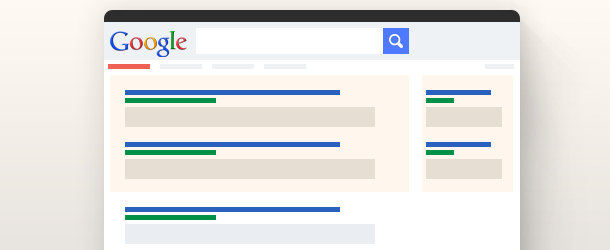



Тут еще никто ничего не писал, стань первым!